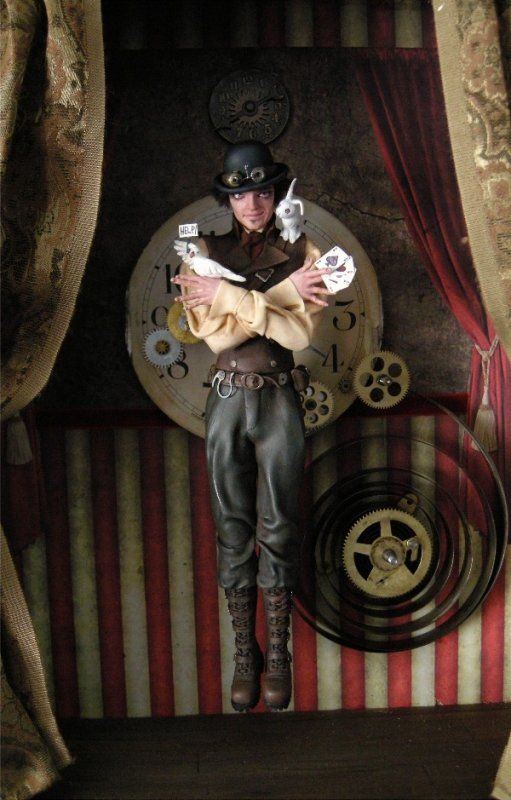With this post I'm going to introduce a book fresh from the oven: "Steampunk: Antología retrofuturista" edited by Felix J. Palma with Fábulas de Albión.
In this work we can find a series of short stories written by the hands of Spanish-speaking writers through those trying to introduce to us in the Steampunk world and other retrofuturisms, inviting us to read it with a dear prologue.
As a general assessment, I must say that it's a good introduction for those who doesn't know this world, ergo, an entertaining anf original reading disposed for arousing the interest of potential readers and, maybe, future followers of this aesthetic.
Concerning those who knew the Steampunk world, it is, maybe, somewhat austere in some ways, quite basic and superficial, maybe.
In its defense, apart from the Steampunk world, it's a nice and amusing reading made-up for this set of stories that we can devour right in the bust trip.
Now I'm going to name those stories that attracted my attention:
- "El aria de la muñeca mecanica" by Care Santos, where we are introduced in the history of a couple of inventors of every kind of things and automata, but always female beings. It's a satire to the female position in the XIXth Century in spite of all those kind of gentlemen with all those kind of paraphilias.
-"Flux" by Fernando Royuela. There are constant references to Zaragoza with a story full of good manners, illegal games and a curious surprise in the end of this. Both a naughty and exciting story.
-"Prisa", by Jose Maria Merino. Nothing less that the invention of the steam-powered motor itsself in the plot of this story, and, of course, all those protests and rebellions in what this meants in that moment, and the events that mean now.
* * * * *
Con este post me dispongo a presentar un libro prácticamente
recién salido del horno: "Steampunk: Antología retrofuturista"
editada por parte de Félix J. Palma junto con Fábulas de Albión.
 En esta obra nos encontramos con una serie de relatos a
manos de escritores hispanohablantes a través de los que tratan de sumergirnos
en el mundo del steampunk y otros retrofuturismos, incitándonos a leerla el
susodicho editor con su entrañable prólogo.
En esta obra nos encontramos con una serie de relatos a
manos de escritores hispanohablantes a través de los que tratan de sumergirnos
en el mundo del steampunk y otros retrofuturismos, incitándonos a leerla el
susodicho editor con su entrañable prólogo.
Como valoración general, decir que es una buena introducción
para todos aquellos que desconocen este mundo, es decir, una lectura amena y
original dispuesta a despertar en interés de posibles lectores y quizá futuros
seguidores de esta estética.
En cuanto a los ya conocedores del mundo del Steampunk,
resulta quizá, un tanto austera en algunos aspectos, muy básica y superficial,
quizás.
En su defensa, ya aparte del mundo del steampunk se trata de
una lectura agradable y entretenida compuesta por este conjunto de relatos que
podemos devorar en pleno viaje de autobús.
Me dispongo a nombrar los relatos que más han llamado mi
atención:
- "El aria de la muñeca mecánica" de Care Santos,
donde se nos presenta la historia de una pareja de inventores de todo tipo de
tipos de autómatas, eso sí, siempre figuras femeninas. Una sátira hacia la
posición de la mujer en el siglo XIX además de todos esos caballeros con todo
tipo de parafilias.
- "Flux" de Fernando Royuela. Una constante de
influencias a Zaragoza con una historia plagada de buenos modales, timbas
ilegales y una curiosa sorpresa al final de esta. Un relato pícaro a la par que
emocionante.
- "Prisa", de José María Merino. Nada menos que la
invención del motor a propulsión trata la temática de este relato, y por
supuesto, todos los actos de protesta y rebelión ante lo que este suponía en su
momento, y los acontecimientos que supone ahora.
 We are
going to dedicate this post to the wonderfull creations by Nicole West, a figure
sculpter that treat very different themes.
We are
going to dedicate this post to the wonderfull creations by Nicole West, a figure
sculpter that treat very different themes. 











